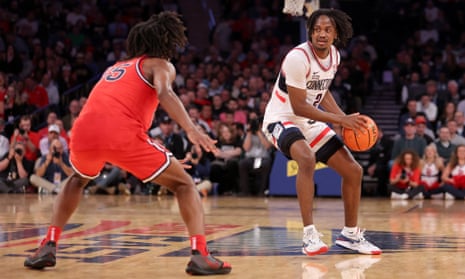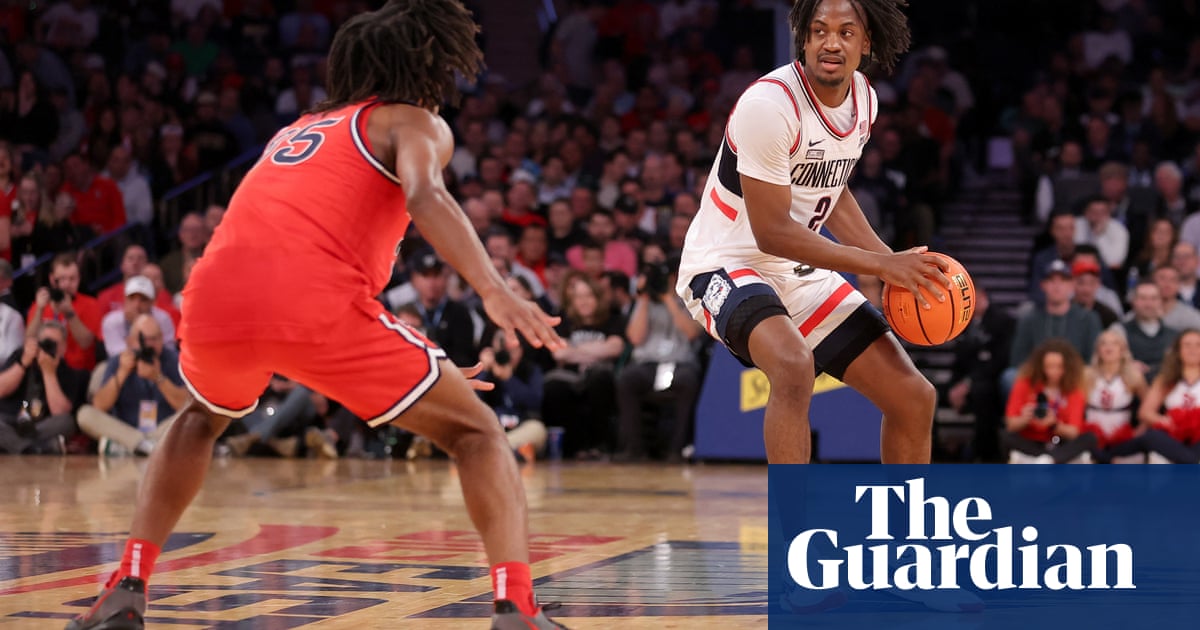
Legal March Madness gambling generates $2.7bn – and plenty of abuse for players
There will be more money riding on the NCAA Tournament than ever before in 2024. But with higher stakes comes more pressure on the athletes
March Madness is famously capricious, but as the tournament gets under way one prediction seems safe – there will be more money riding on it than ever before. But higher stakes carry increased risks and the threats and abuse directed at student-athletes are growing.
Americans will legally wager an estimated $2.72bn on the men’s and women’s March Madness events this year according to the American Gaming Association, a trade group. That is only a small fraction of the likely total, with many more billions expected to be ventured through unlicensed channels such as bracket pools.
The college basketball tournament is the biggest annual sports betting bonanza in the US and is anticipated to reap double the amount that was legally wagered on this year’s Super Bowl.
Gambling on sports, which was essentially illegal outside Nevada until 2018, is now permitted in 38 US states and Washington DC. As it embraces mobile technology and partners with major leagues and media companies the legal sector has grown with astonishing speed, handling $120bn in wagers in 2023 (up 28% from the previous year) and posting $11bn in revenue (a rise of 45%) even though it remains prohibited in the two most populous states, California and Texas.
Legal sports betting was launched in the college basketball hotbed of North Carolina just in time for the start of March Madness, which concludes for the men with the championship game in Glendale, Arizona, on 8 April, with the women’s final in Cleveland a day earlier.
While the risks of addiction that come with legalised betting are well documented, gambling may also heap added, unwelcome, pressure on players and coaches. Within a few days of the introduction of legal sports betting in Ohio in January last year, Anthony Grant, the head basketball coach at the University of Dayton, excoriated gamblers for harassing his players online after losing bets.
“There’s some laws that have recently been enacted that really to me could change the landscape of what college sports is all about,” he told reporters. “And when we have people that make it about themselves and attack kids because of their own agenda, it sickens me.”
The NCAA, college sports’ main governing body, is concerned. “Recent data indicates that approximately one in three high-profile athletes receive abusive messages from someone with a betting interest,” the NCAA president, Charlie Baker, wrote this month in a letter to campus leaders. “Data also indicates 90% of that harassment is generated online or through social media, while the other 10% is occurring in person, with some generated from other students on campus.”
Officials, coaches and other athletics-related workers are also targets, he added. An NCAA spokesperson said that higher-profile events typically attract increased volumes of abuse – and nothing in college sports is more prominent than March Madness.
“Our students are under a lot of strains and stresses and athletes are under tremendous pressures and then this just adds another layer. People can get directly to you and fill your direct messages with hate, it’s a whole new world,” says Jason W Osborne, a professor at Miami University in Ohio and member of the university’s Institute for Responsible Gaming. “We as institutions need to do a lot more to try to protect. I think a lot of the institutions are working very hard to get ahead of this but it’s a very dynamic environment.”
Universities and the NCAA are investing in education, support and research around the issues brought up by gambling. But gamblers appear less inclined to keep their emotions in check now that sports betting is no longer an underground activity. “These harassing behaviours seem to have gone up because of the legalisation and normalisation,” says Amanda Blackford, director of operations and responsible gambling at the Ohio Casino Control Commission.
Ohio is home to a number of sporting powerhouses, and is already one of the most important betting markets in the US. More than $7.6bn was legally wagered on sports in the state last year, nearly all placed using mobile and other online devices, translating to about $135m in tax revenue collected by the state.
Ohio acted swiftly in response to the kind of harassment highlighted by Grant, passing a law in 2023 that seeks to make it easier to stop gamblers who threaten athletes from placing bets in the state. Despite resistance from some gaming operators, last month it agreed to the NCAA’s request to prohibit “prop” bets on the individual performances of college athletes, such as how many points a basketball player might score in a game. Maryland and Vermont have also recently forbidden prop betting on college players.
Efforts by betting giants to enter universities via sports sponsorships stalled after a backlash. Still, gambling has rapidly become ingrained in campus cultures. A 2023 NCAA survey found that two-thirds of 18- to 22-year-olds living on campus “are bettors”, 41% have wagered on their school’s teams and that problem gambling is prevalent, with “16% having engaged in at least one risky behaviour and 6% reporting that they have previously lost more than $500 on sports betting in a single day.” Young people are especially vulnerable to developing a gambling problem because their decision-making abilities have not fully matured.
A bill that would require universities in Maryland to use geofencing technology to block online gambling on campuses is under consideration in the state legislature. “We think it’s a big issue,” says Pam Queen, a state representative sponsoring the bill. She is also a professor at Morgan State University in Baltimore. “There is a lot of gambling, online betting is generating more interest from a younger generation,” she adds. “These aren’t students who would go to a casino but they’re doing things on their phone.”
after newsletter promotion
Such widespread participation adds to the burden on student-athletes. “At the college level you’re in classes with your peers who are betting on you,” Blackford says. She cites the example of a student who sent a demand for money to a friend who had a bad game, “saying, ‘you cost me this bet, you owe me now’.”
Snippets of news that a player might disclose to a classmate are potentially highly valuable. “You can as an athlete just casually say, ‘oh, my friend is on the injured reserve’. Because that’s just part of your life,” Osborne says. “But now in a gaming environment that could be insider information. That could skew the odds, if you have that information you can have an advantage and that could get people in trouble.”
More than a dozen people at Iowa State and Iowa universities were criminally charged last year with placing bets illegally, including while underage and on games in which they played. The NCAA last month sanctioned Brad Bohannon, the former University of Alabama baseball coach, for allegedly providing inside information about an injured starting pitcher via text message to a gambler who then reportedly tried to place a $100,000 bet on an Alabama game but was restricted to $15,000.
That suspicious attempt was flagged by US Integrity, a Nevada-based monitoring company that partners with numerous leagues, gambling operators and regulators. It also reported unusual movement in the point spread related to a Temple University basketball game earlier this month that is the basis of an ongoing investigation. Also this month, Loyola University Maryland said it removed an individual from its basketball programme for a “gambling violation”.
“The most vulnerable sports are always one-on-one: tennis, MMA, boxing,” says Matt Holt, the US Integrity president and founder. But basketball requires relatively few players compared to other team sports like football, soccer and baseball, and its high-scoring nature makes it especially susceptible to point shaving. “In terms of team sports, I do think especially in North America, basketball, college and pro, is the most vulnerable,” Holt says. “If you get the starting point guard and the main scorer, you can almost guarantee they can get the result for you.”
However, Holt believes that the ability of college athletes to monetise their name, image and likeness since 2021 reduces the temptation to fix matches. “Now that we have collegiate athletes literally making seven figures I do think that that gap [with the professional ranks] has shrunk quite a bit. We’re no longer talking about guys that can barely afford to buy a pizza on the weekend,” he says.
The inevitable shock results, overflowing passions and sheer number of fans wagering on March Madness are a recipe for a flood of gamblers venting their frustrations. At least, Holt argues, the tournament’s importance mitigates against the potential for match-fixing: too many people are paying too much attention. “It’s usually regular-season games when there’s less eyeballs on it and they think they’re more likely to get away with it,” he says.
“It’s harder to convince somebody to underperform in a March Madness game when this has been their hopes and dreams for their entire life and now they’re on the big stage with the opportunity to do something historic. Much easier to convince them to manipulate a regular-season game with a much smaller impact.”
